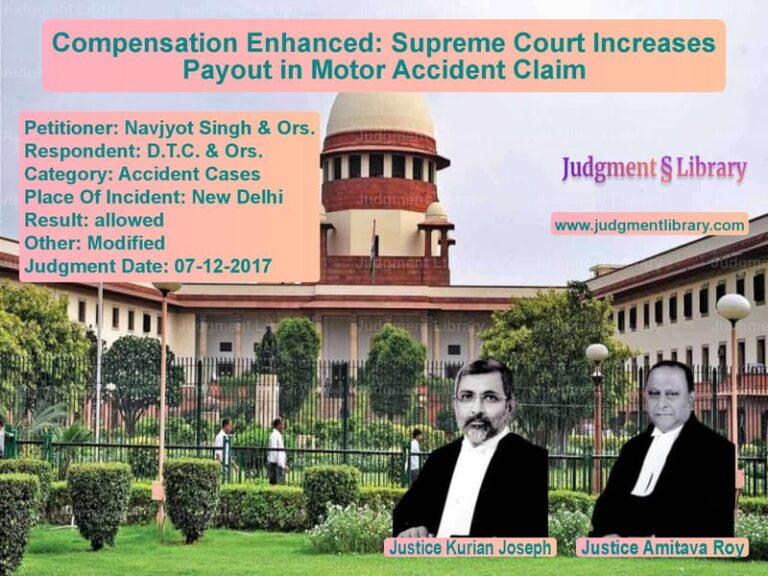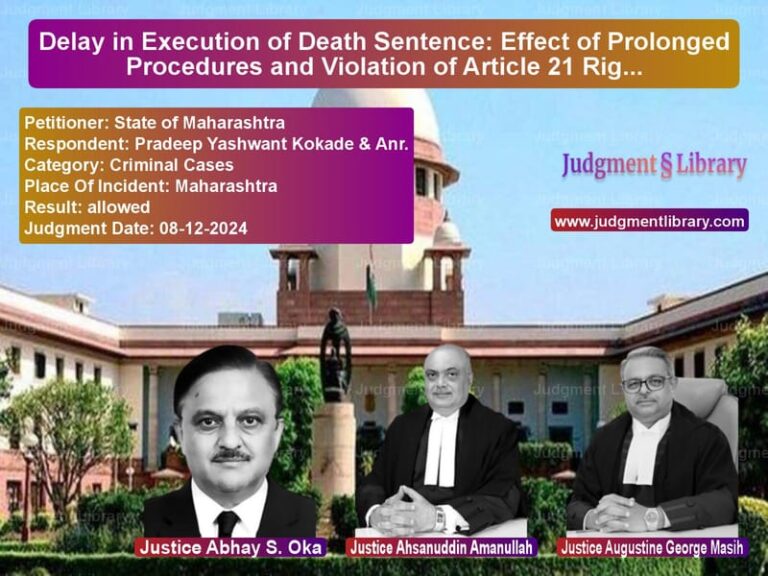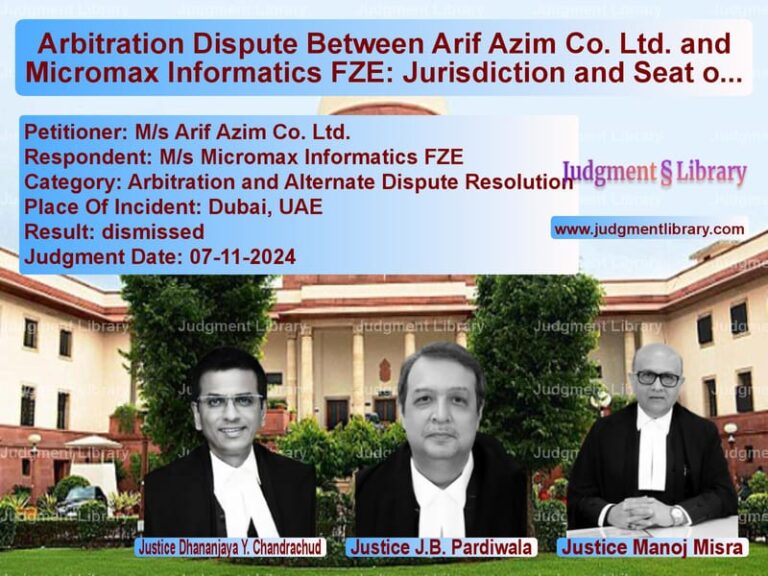Supreme Court Dismisses Adverse Possession Claim in Chennai Property Dispute
The Supreme Court of India recently ruled in the case of M. Radheshyamlal vs. V. Sandhya & Anr., dismissing the appellant’s claim of adverse possession over a disputed property in Chennai. The ruling reaffirmed the strict requirements for proving adverse possession and emphasized the need for clear, uninterrupted, and hostile possession against the actual owner.
Background of the Case
The dispute concerned a property originally owned by Sungani Bai (also referred to as Sukri Bai), who died in 1947. Before her death, she executed a registered settlement deed on December 1, 1945, in favor of three individuals: Gopu Bai, Abbey Karan Joshi, and Vijay Kishan Bohra. The settlement deed specified life interests and succession rights, eventually passing ownership to their respective male descendants.
The appellant, M. Radheshyamlal, claimed that he and his family had been in uninterrupted possession of the property for over 45 years, thereby acquiring ownership through adverse possession. On this basis, he filed a suit seeking a declaration of ownership and a permanent injunction against dispossession.
The respondents, V. Sandhya and others, contested the claim, arguing that the property had been lawfully transferred to them through a sale deed dated January 29, 2001. They asserted that the appellant’s possession was unlawful and did not meet the legal requirements for adverse possession.
Key Legal Issues
- Whether the appellant had established ownership of the property through adverse possession.
- Whether the respondents had a valid title to the property based on the registered settlement deed and subsequent sale.
- Whether the appellant’s claim could override the lawful ownership rights of the respondents.
Arguments by the Appellant (M. Radheshyamlal)
The appellant contended that:
- He had been in open, uninterrupted, and continuous possession of the property since at least 1951.
- His father and other family members had occupied the property for decades without any interference from the legal owners.
- The original owner, Sungani Bai, had passed away intestate, leaving no direct heirs to challenge his possession.
- Since he had been paying property taxes and maintaining the property, his possession was open and hostile to any competing claim.
Arguments by the Respondents (V. Sandhya & Others)
The respondents, represented by their legal counsel, countered that:
- The property had been lawfully settled in 1945, and ownership had passed through legal heirs.
- The appellant’s claim was misleading, as he had not provided evidence of uninterrupted possession against the rights of the true owners.
- The appellant himself acknowledged that he was aware of the settlement deed but failed to disclose it in his suit.
- The plaintiff had not demonstrated actual ownership but merely unauthorized occupation of a portion of the property.
Supreme Court’s Observations and Judgment
1. Legal Principles of Adverse Possession
The Court emphasized that adverse possession requires a claimant to establish:
- Continuous, open, and uninterrupted possession for at least 12 years.
- Possession that is hostile and against the rights of the true owner.
- Public knowledge of the adverse possession.
The Court referenced the Constitution Bench ruling in M. Siddiq (Ram Janmabhumi Temple case), which held:
“A person who sets up a plea of adverse possession must establish both possession which is peaceful, open, and continuous possession which meets the requirement of being nec vi, nec clam, nec precario.”
2. Failure to Prove Adverse Possession
The Court noted that the appellant had failed to meet the stringent legal requirements for adverse possession. It observed:
“The plaintiff has not established when his possession became adverse to the true owner, nor has he demonstrated an intention to possess the property as an owner.”
3. Documentary Evidence Contradicted the Appellant’s Claims
The Court found inconsistencies in the appellant’s assertions. It noted:
- The property tax records remained in the name of the original owner.
- The appellant’s complaint to the police in 1995 mentioned possession for 35 years, contradicting his claim of possession since 1951.
- The Court Commissioner’s report described the property as “dilapidated,” indicating a lack of active ownership.
4. Ownership Rights of the Respondents Upheld
The Court ruled in favor of the respondents, affirming the validity of the 1945 settlement deed and the subsequent sale. It held:
“The respondents have a better title to the suit property than the appellant, whose claim is based purely on unauthorized occupation.”
5. Grant of Extended Time to Vacate the Property
Recognizing that the appellant was over 80 years old and had been in possession of at least part of the property for decades, the Court provided an extended timeframe for vacating:
- The appellant and his family were granted time until March 31, 2025, to vacate the premises.
- They were required to file an unconditional undertaking to vacate within one month.
- Failure to comply would result in immediate execution of the possession decree.
Implications of the Judgment
This ruling has several key legal implications:
- Reinforces stringent requirements for adverse possession: Mere long-term occupation is insufficient to claim ownership.
- Protects legal property owners: Ensures that titleholders can reclaim possession against trespassers.
- Establishes clear documentation standards: Encourages property owners to maintain proper legal records.
- Sets a precedent for balancing equity and law: The Court’s decision to allow extended vacating time reflects a balance between legal ownership and humanitarian considerations.
The judgment upholds property rights while ensuring that individuals in long-term unauthorized possession are given adequate time to relocate.
Petitioner Name: M. Radheshyamlal.Respondent Name: V. Sandhya & Anr..Judgment By: Justice Abhay S. Oka, Justice Ujjal Bhuyan.Place Of Incident: Chennai, Tamil Nadu.Judgment Date: 18-03-2024.
Don’t miss out on the full details! Download the complete judgment in PDF format below and gain valuable insights instantly!
Download Judgment: m.-radheshyamlal-vs-v.-sandhya-&-anr.-supreme-court-of-india-judgment-dated-18-03-2024.pdf
Directly Download Judgment: Directly download this Judgment
See all petitions in Property Disputes
See all petitions in Specific Performance
See all petitions in Judgment by Abhay S. Oka
See all petitions in Judgment by Ujjal Bhuyan
See all petitions in dismissed
See all petitions in supreme court of India judgments March 2024
See all petitions in 2024 judgments
See all posts in Civil Cases Category
See all allowed petitions in Civil Cases Category
See all Dismissed petitions in Civil Cases Category
See all partially allowed petitions in Civil Cases Category







